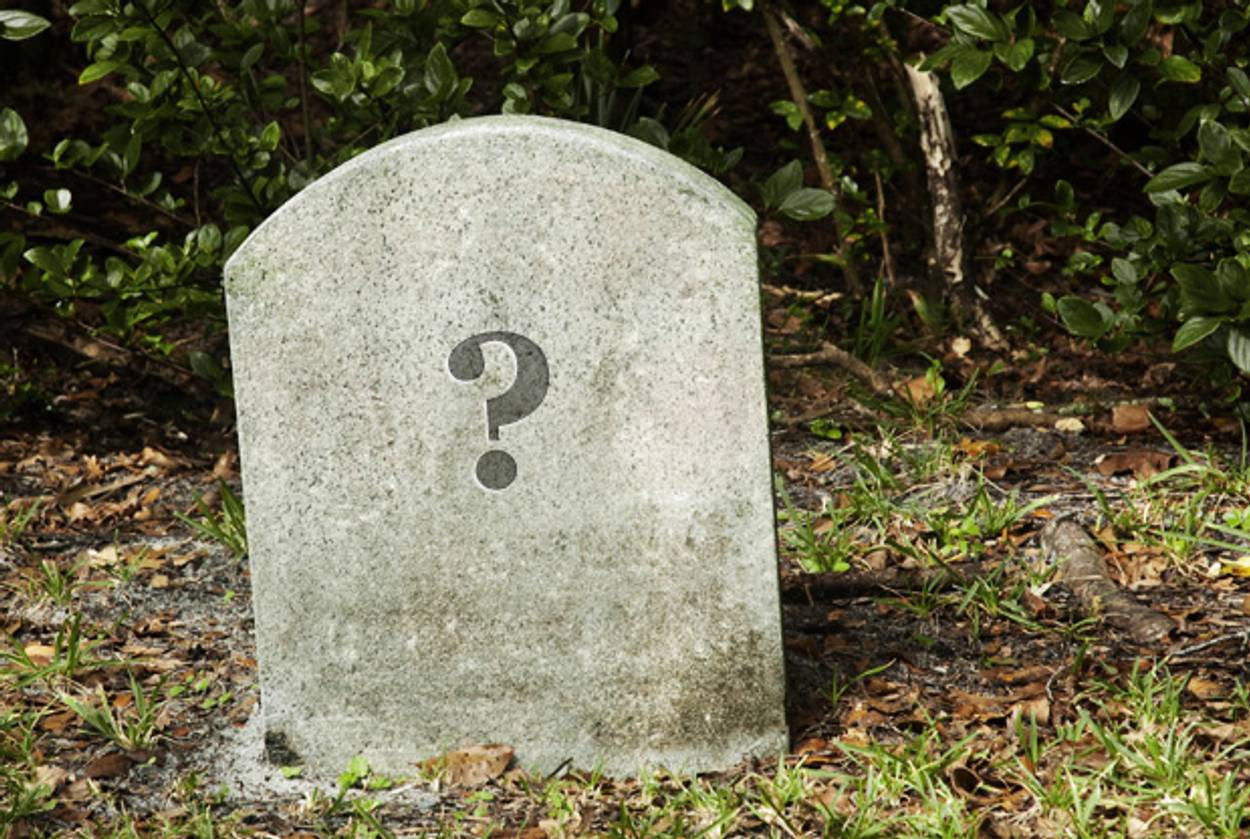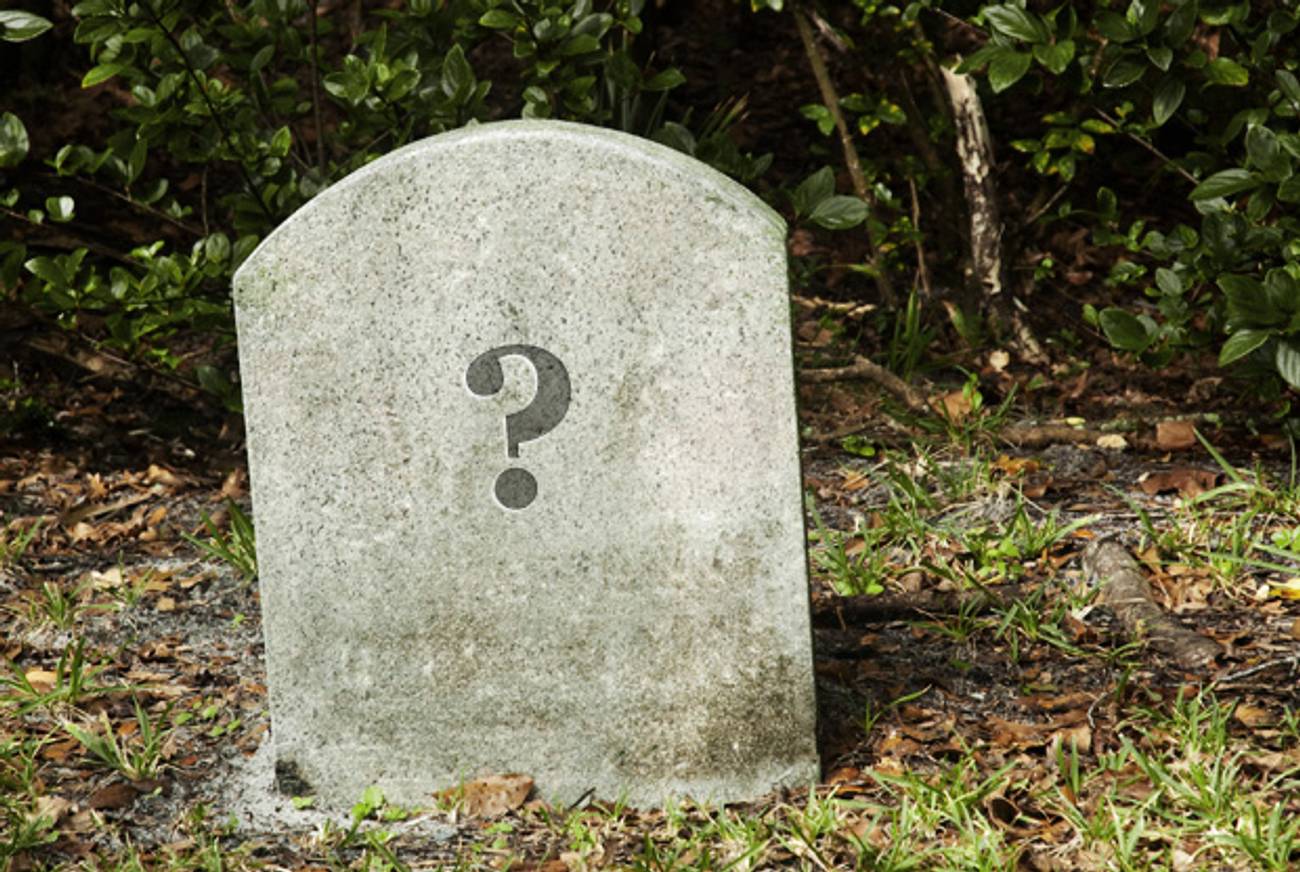Burying a Man of Mystery
By giving a stranger a proper funeral, my community did a mitzvah. What if he wasn’t actually Jewish?




In the earliest morning minyan, with the day still shrouded in mist, a gray-bearded man lumbered to the front of the shul and stood before the Holy Ark. “This morning we have a meis mitzvah: A man has died with no relatives,” he said. “He has been in a state morgue in a refrigerator since May 18—for five months! We need a minyan for burial. Anyone who can, please come to the cemetery at 9:30 a.m.”
A meis mitzvah is a corpse with no one to bury it. Woe is to the community that allows such a person to lie in disgrace. We have it on word from the rabbis of old that the soul is in “tormented unrest” until the body is in the ground. The Talmud further tells us that even the High Priest on his way to the Temple to bring the Passover sacrifice must defer his journey for the sake of a meis mitzvah. It feels impossible in today’s day and age for someone to die with no one to bury him. Everyone belongs to someone, it seems, but this man—a certain Bernard Weiner of Newark—did not. He lived alone in a tenement and died with no relatives or kin to claim his body, left in a limbo in the cracks of the community.
How often does one can get a chance to do this particular mitzvah? Our sages called it the “ultimate kindness” or truest of kindnesses because it is one for which there can be no recompense. “I can be there,” I told the man who made the announcement, making the decision in a split-second.
I arrived at the cemetery in Clifton, sister to our hometown of Passaic, N.J., to find a dozen or so men from the neighborhood: rabbis, quasi-rabbis, the semi-employed, the rich who make their own hours, and the poor whose hours are made for them. In the muggy autumn morning, we took the body of Bernard Weiner out of the hearse in a simple pine box. It was heavy. Every three steps we stopped to say verses from tehillim. One man was nominally in charge, telling us when to stop, when to start, when to say, what to say. Another man began the tziduk hadin, the prayer for the dead that mourners recite: “We accept divine judgment and beg for His mercy on the living,” he began.
“No,” he was told by someone else in the group. “The custom is to say this after the burial.”
A quibble ensued about the correctness of this custom.
“No, it is this way.”
“By us, we always said it before burial.”
The rest of us non-experts in Jewish law looked on in sadness and stupefaction.
There was a big hole hollowed out in a corner of the cemetery. It was deep. Very deep. As if to make plain that there is no escape. This is it. It is final.
“Turn the coffin around,” someone said. “His head must be faced in the proper direction.”
With staccato, herky-jerky movements, we pivoted carefully so as not to stumble into the grave.
The casket was lowered and placed onto boards over the hole. Then with ropes we lowered the body. Our crew immediately went to work with shovels. It was a lot of work to fill up a grave. Most of us were middle-aged. A bespectacled man was out of breath; another tall man, immaculately dressed, attacked the pile of red earth with both hands. He reminded me of the fabled John Henry who won a contest with the steam shovel. Even here, even now, I thought, there is competition.
What was going through our minds? One could hear the crunch of the shovel hitting the earth, and then the sound of the earth flung against the coffin with a gentle thud. How much time did each of us have left before our time came? What would we do with our day today?
And one unanswerable question: Who was Bernard Weiner?
Finally, after the last shovel, there was a murmur: “Someone should say something … ”
“Yes, there should be words.”
“But who?”
“No one knew this man.”
Finally, a man from the chevra kadisha emerged from the crowd; he had negotiated the body from the authorities and knew more of the story than we did.
“Bernard Weiner, son of Beatrice and Morris Weiner, long gone, was a Jew who lived in Newark. And we, a bunch of people from far away, have just buried him. He was in a refrigerator in a morgue for five months, poor soul. He died and his mechanic, a gentile man, knew he was Jewish and told his other customer, a certain Rabbi Kaplan, that he was a Jew and needed to buried as such. The state had custody of his body, and he had to become legally disentangled from the government in order to receive his body for a Jewish burial. Who knows what zechus, what merit he has and we have, to be with him today, to do him this last honor? There are no coincidences. God watches everything we do, and He alone takes and pays back.”
A marker with his name on it was stuck in the fresh earth. We moved closer together for the Kaddish, our shoulders imperceptibly hunched toward one another.
Then, in a surprise to everyone, one of the men standing near me said in an undertone that he had learned from someone in the chevra kadisha that Bernard Weiner had been adopted: “He may not even have been Jewish at all,” he concluded.
As this strange, unexpected news moved through the ranks, it jolted people slightly apart from each other like a mild electrical shock.
“Did we do the right thing?” someone asked. “After all, this is a Jewish cemetery.”
“Of course! What choice did we have? His parents were Jewish and they most probably converted him.”
“Maybe he himself didn’t know who he was.”
We’ll never know for sure, I thought. Dead men tell no tales.
Someone started Kaddish, and the crowd of men, now heavily perspired answered amen in the hazy mid-morning sun. The Talmud tells us that one should pray with all his might for a peaceful end even to the last clod of earth thrown onto his grave. Who knows where we will be from one minute to the next? Who knows where we will end up?
The group dispersed—every man to his car, be it humble or grand. This one to a beat-up passenger van, another to his Lexus SUV, a third to his shiny get-about.
The Jews of Passaic had buried nobody’s dead, but also one of their own.
***
Like this article? Sign up for our Daily Digest to get Tablet Magazine’s new content in your inbox each morning.
Alter Yisrael Shimon Feuerman, a psychotherapist in New Jersey, is director of The New Center for Advanced Psychotherapy Studies. He is also author of the Yiddish novelYankel and Leah.
Alter Yisrael Shimon Feuerman, a psychotherapist in New Jersey, is director of The New Center for Advanced Psychotherapy Studies. He is also author of the Yiddish novel Yankel and Leah.